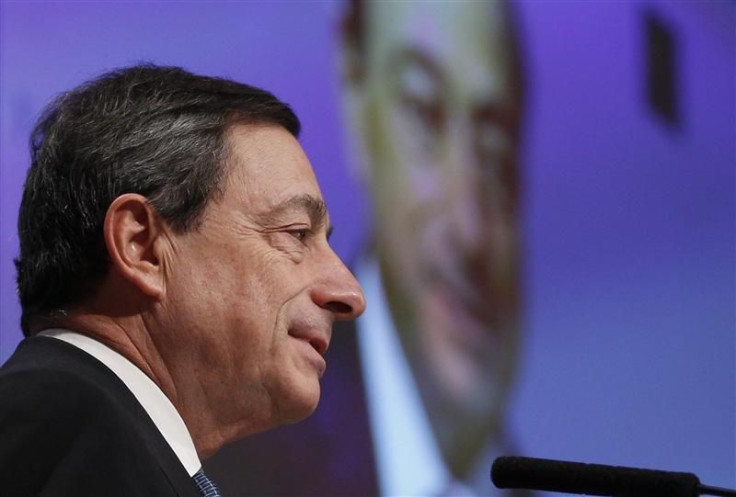Italian Yields Fall on ECB; Contagion Risks Remain

Italian and Spanish government debt yields fell on Friday, as the European Central Bank bought bonds in the secondary market, but held close to unsustainable levels as contagion fears and money market stress raised the pressure for policymaker action.
Italy's new technocrat prime minister, Mario Monti, faces a lower house confidence vote after unveiling sweeping anti-crisis measures on Thursday and Greece's national unity government was due to submit a 2012 austerity budget to parliament.
But many in markets say austerity measures will be unable to contain the debt crisis, putting pressure on the European Central Bank to tide the region over with bond purchases until policymakers can agree on more effective action.
They can say whatever they want, whether they can put it in place, that's a different matter. I have got no confidence in any of these austerity plans getting through because of the weak growth scenario that is developing, a trader said.
The ECB has got to come in and buy bonds (unsterilised). That's the only thing that will solve it and there is no way they are going to do that. Certainly based on the German and ECB noises, there doesn't seem to be any signs that is going to occur.
ECB President Mario Draghi said on Friday that the bank was contributing to economic stability while maintaining its independence. He also warned that there would be a huge social and economic impact if the ECB were to lose its credibility.
Yields on 10-year Italian government bonds hit 6.98 percent. Analysts see yields of 7 percent as unsustainable.
Italian yields later dipped to 6.78 percent, down 13.5 basis points, with traders saying the ECB was buying. One said the bank was intervening in the 5-10 year part of the curve.
Spanish 10-year yields rose as far as 6.55 percent before retracing to 6.44 percent, down 7.3 bps on the day.
The gap between Italian and Spanish yields has narrowed in recent sessions -- a development one analyst said showed the crisis was escalating.
The yields are likely to converge further with Spanish yields set to jump as the January 2022 bond sold on Thursday becomes the new benchmark at that maturity.
It's symptomatic of the fact that one individual country can't influence this now, it's a systemic issue, Lyn Graham-Taylor, rate strategist at Rabobank, said.
We all know that Spain has better fundamentals than Italy but now the market is just viewing them as ... the same risk.
PRESSURE ON ECB
German Bund futures pared early gains after the ECB bond purchases, standing five ticks higher on the day at 137.37, with 10-year German yields down 1 bps at 1.89 percent.
Signs contagion was spreading to core euro zone countries and stress in money markets earlier in the week increased pressure on the ECB and euro zone policymakers.
Until they deliver, German bonds can benefit, analysts say.
There will be no stability without austerity, as we hear too often in Frankfurt. But that is no longer enough, given the recession and the seizure of the funding markets. A sensible support plan is needed, Societe Generale strategists said in a note. With the ECB still dragging its feet, the flight to quality can continue.
The ECB is reluctant to take on a bigger role for fear of undermining its independence from politics and its price stability mandate when euro zone inflation is at 3 percent -- above a target of just below 2 percent.
A German newspaper reported the ECB had secretly imposed a weekly limit of about 20 billion euros ($27 billion) on its euro zone sovereign bond-buying programme.
But bond strategists in a Reuters poll see an even chance of a bigger role for the ECB. The 50 analysts polled gave a median 48 percent probability that the ECB will be forced to conduct outright quantitative easing (QE) and a slim majority bet it could become a lender of last resort.
© Copyright Thomson Reuters 2024. All rights reserved.





















